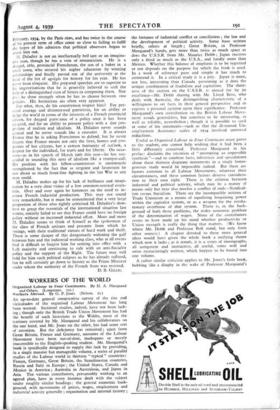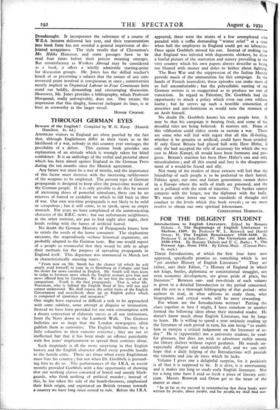WORKERS OF THE WORLD
Organised Labour in Four Continents. By H. A. Marquand and Others. (Longmans. iss.)
AN up-to-date general comparative survey of the rise and vicissitudes of the organised Labour Movement has long been wanted. Sectional studies, indeed, have not been lack- ing ; though only the British Trade Union Movement has had the benefit of such historians as the Webbs, most of the territory covered by Mr. Marquand and his collaborators on the one hand, and Mr. Jones on the other, has had some sort of attention.. But the deficiency has remained ; apart from Great Britain, France and Germany, accounts of the Labour Movement have been out-of-date, inadequate or merely inaccessible to the English-speaking student. Mr. Marquand's book is specifically designed to supply this lack by providing, in a single massive but manageable volume, a series of parallel studies of the Labour world in thirteen " typical " countries: France, Germany, Great Britain, the Scandinavian countries, Russia and Italy in Europe ; the United- States, Canada and Mexico in America ; Australia in Australasia, and Japan in Asia. The various contributors, presumably working to an agreed plan, have in every instance dealt with the subject under roughly similar headings: the general economic back- ground, with movements of prices, wages, employment and industrial activity generally ; organisation and internal history ; the fortunes of industrial conflict or conciliation ; the law and the development of political activity. Some have written briefly, others at length ; Great Britain, in Professor Marquand's hands, gets more than twice as much space as does the U.S.S.R. from Mr. Maurice Dobb ; Japan receives only a third as much as the U.S.A., and hardly more than Mexico. Whether this balance of emphasis is to be regretted or not depends on the purpose for which the book is used.
In a work of reference pure and simple it has much to commend it. In a critical study it is a pity. japan is more, not less, interesting than Canada presenting as it does the unique combination of feudalism and capitalism. The short- ness of the section on the U.S.S.R. is atoned for by its excellence—Mr. Dobb sharing with Mr. Lloyd Ross, who deals with Australia, the distinguishing characteristic of a willingness to set facts in their general perspective and to express a personal opinion upon their significance. Professor Marquand's own contribution on the British Labour Move- ment avoids generalities, but contrives to be interesting, as well as reliable, nevertheless ; though it is possible to cavil at some of his statements—such as that the ill-starred Un- employment Assistance scales of 1934 involved universal reductions.
Useful as Organised Labour in Four Continents must prove to the student, one cannot help wishing that it had been a little differently conceived. Professor Marquand in his preface disclaims the intention of " attempting an impossible synthesis "—and to combine facts, inferences and speculations about these thirteen disparate movements in a single homo- geneous study would be impossible indeed. But there are factors common to all Labour Movements, whatever their circumstances, and these common factors deserve considera- tion in their own right. There is the relation between industrial and political activity, which may be a matter of means only but may also involve a conflict of ends--Syndical- ism versus Socialism. There are the incompatible notions of Trade Unionism as a means of equalising bargaining power within the capitalist system, or as a weapon for the revolu- tionary overthrow of that system. There is, in the back- ground of both these problems, the wider economic problem of the determination of wages. None of the contributors seems to have made up his mind whether productivity or Union strength is really the thing that matters. (We know where Mr. Dobb and Professor Roll stand, but only from other sources.) A chapter devoted to these more general ideas would have given the whole book a unifying theme which now it lacks ; as it stands, it is a series of monographs, all competent and instructive, all useful, some well and some excruciatingly written, which happen to be bound into one vohame.
A rather similar criticism applies to Mr. Jones's little book, bobbing like a dinghy in the wake of Professor Marquand's
Dreadnought. It incorporates the substance of a course of W.EA lectures delivered last year, and their transmutation into book form has not avoided a general impression of dis- jointed scrappiness. The style recalls that of Chesterton's Mr. Hibbs However, and some passages have to be read four times before their precise meaning emerges. But unsatisfactory as Workers Abroad may be considered as a book, it offers a wholly admirable starting-point for discussion groups. Mr. Jones has the skilled teacher's knack of so presenting a subject that the nature of any con- troversial point involved is conspicuous at once ; controversies merely implicit in Organised Labour in Four Continents here stand out boldly, demanding and encouraging discussion. Moreover, Mr. Jones provides a bibliography, which Professor Marquand, really unforgivably, does not. One retains the impression that this dinghy, however inelegant its lines, is at least as seaworthy as the larger vessel.
HONOR CROOME.









































 Previous page
Previous page